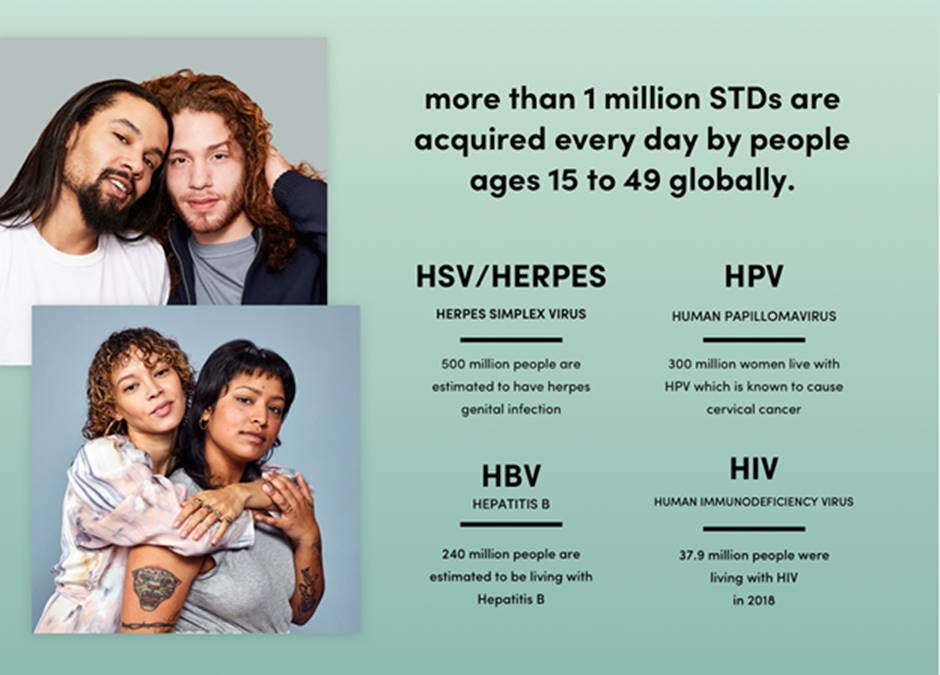This website uses cookies to enhance the user experience. By using Yoppie you are agreeing to our use of cookies.
Yoppie's Guide To The 4 Most Common Incurable STIs
Written by Yoppie
19 May 2021
What’s an STI, and is it different from an STD?
How common are STIs?
Herpes
HPV
Hepatitis B
HIV
How do you avoid STIs?
What if you have an STI?
Often the STIs that can be cleared up with antibiotics get the most airtime. But what about the incurable ones? We’re taking a look at the 4 most common incurable STIs, with the help of some handy research from Hers, so whether you want to know how to avoid them, or you currently live with one, we’ve got the details…
What’s an STI, and is it different from an STD?
STI stands for sexually transmitted infection, and it’s pretty much what it says on the tin; an infection passed on through sexual contact. The terms STI and STD (sexually transmitted disease) are often used interchangeably, but they’re essentially the same thing.
How common are STIs?
STIs are more common than we’d like to think (especially when we’re getting busy with a sexual partner!). According to the World Health Organisation, over 1 million curable STIs (that’s the likes of chlamydia and gonorrhoea) are contracted every day globally by those aged 15 to 49… 1 million! Remind us again why hardly anyone talks about them?
Here are the 4 most common incurable STIs (graphic courtesy of our friends at Hers):

Herpes
Herpes has oral (HSV-1) and genital (HSV-2) varieties. Genital herpes spreads through vaginal, anal or oral sex, and an estimated 500 million people have it globally. Though it can be harmless and cause no complications, symptoms include blisters that burst to leave sores around the genitals, anus, thighs or bottom.
Genital herpes complications include inflammation around the bladder and rectum, and in very rare cases, meningitis. Neonatal herpes (babies born to a mother with the virus) can be very serious for newborns, so antivirals are often used to suppress the virus and a cesarean delivery may be recommended.
If you have symptoms, even if you haven’t had sex for a while, you should get tested. There's no cure, but symptoms often clear up by themselves. If outbreaks continue to occur throughout your life, your doctor can prescribe treatments like antiviral medications to stop symptoms progressing, or cream for any pain.
HPV
HPV stands for human papillomavirus, the name given to a group of 100+ types of viruses. You can catch it through vaginal, anal or oral sex, or sharing sex toys. HPV is very common, and most people end up with it at some point in life. It’s thought 300 million women live with HPV, and the number of men is estimated to be just as high.
There are no symptoms so most people don’t know they have it, even though it can remain in your system for life. Your body will usually fight HPV on its own within 2 years, but in rare cases it can lead to cervical cancer, so it’s important to know if you have HPV so you and your doctor can monitor it.
HPV testing is done as part of your routine cervical screening test, so if you do have HPV, you’re likely to find out during this screening. Unfortunately there are no treatments, but in the UK, school aged children often receive the HPV vaccine, which stops people getting high-risk HPV. If you missed it, you can get it on the NHS until age 25.
Hepatitis B
Hepatitis B is a viral infection of the liver contracted through blood and body fluids. Those most at risk are people in high-risk countries, who inject drugs, or who have unprotected sex with multiple partners. An estimated 240 million people live with chronic hepatitis B globally.
Hepatitis B usually has no symptoms, and passes on its own after a few months, but there’s no cure, and if not monitored it can cause more serious liver damage. Chronic hepatitis B can last for at least 6 months, and those with this type may carry it for life.
If you are at higher risk, a hepatitis B vaccine is available. Treatment-wise, chronic hepatitis B can be kept at bay with medicines. If after 6 months tests show you still have it, your liver may be checked and you could be put on medications to reduce risk of complications.
HIV
HIV stands for human immunodeficiency virus, which damages immune system cells and weakens your ability to fight everyday infections. HIV transmits through unprotected vaginal or anal sex, sharing needles, or through pregnancy, birth or breastfeeding. In 2019, an estimated 38 million people were living with HIV globally.
2 to 6 weeks after infection, most people notice flu-like symptoms lasting a week or two. Though this disappears, HIV may stay in the body for years after, and continue to damage the immune system. If you have reason to believe you could have HIV, always get tested. There's no cure, but with early diagnosis there are antiretroviral medicines that enable most to live a healthy life and avoid developing life-threatening AIDS-related illnesses.
How do you avoid STIs?
There are several ways to lessen your chances of contracting an STI. According to the CDC, the most effective methods of prevention are:
- Vaccination: These can prevent hepatitis B and HPV if taken before exposure
- Condoms: Always using condoms can’t remove risk entirely, but can greatly reduce it
- Reducing your number of sexual partners: Mutual monogamy with one sexual partner, or limiting your number of partners can lower STI risk
- Testing: Ensure you and your partner are tested for STIs before having sex
What if you have an STI?
Speak to your doctor regularly to ensure you are as healthy as possible, as they can recommend treatments to help ease symptoms. And remember, if you live with an incurable STI, you’re certainly not the only one! Don’t feel ashamed to speak to your GP and your partner about it, so you can understand the risks, and even enjoy a healthy sex life.
Do you have questions about STIs? Shout out in our private Facebook group or drop us a note on Insta @itsyoppie. Don't forget that our personalised period box can get organic tampons, PMS supplements and more delivered easily and regularly through your letterbox, keeping your menstrual cycle worry free.
Section jump
Back to top
Subscribe To Our Newsletter
YOPPIE





© 2026 Yoppie is a registered trademark of Phlo Technologies Ltd.
Yoppie's supplements are not a substitute for a varied diet and healthy lifestyle and are not intended to diagnose, treat, or cure any disease. If you are pregnant, breastfeeding, have a medical condition or are under medical supervision, please consult with your doctor before taking any of our products.






